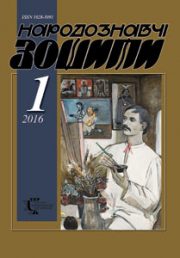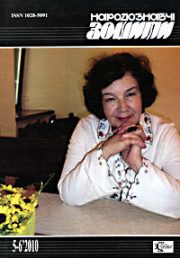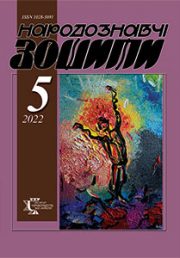The Ethnology Notebooks. 2019, 2 (146), 430—436
UDK 001:93(477-87)-051Шумовський:001.32НТШ(477):394.32
DOI https://doi.org/10.15407/nz2019.02.430
YURII SHUMOVKY’S LETTER TO THE SHEVCHENKO SCIENTIFIC SOCIETY
YAREMCHUK Valentina
ORCID ID: https://orcid.org/0000‑0003‑3445‑3027
Post-graduate student,
Department of the Modern Ethnology,
Institute of Ethnology
of the National Academy of Sciences of Ukraine,
15, Svobody Avenue, 79000, Lviv, Ukraine
Contacts: e-mail: v_viktorivna@ukr.net
Abstract. At the present stage of the Ukrainian state-building, historians are trying to bring out of forgetfulness those famous socio-political and cultural figures as well as scholars who were unfairly «forgotten» in the Soviet period. Of particular interest are those individuals who, due to certain political circumstances, were outside of Ukraine and made a significant contribution to the material culture of their motherland and other states that provided them with protection and security. First of all, it concerns the representatives of the Shevchenko Scientific Society and enthusiasts of the Ukrainian national science that were spread across different continents after the Second World War. It is worth mentioning that the Shevchenko Scientific Society in the USA which picked up the scientific and publishing baton of the institution founded in Ukraine and duly represented the free scientific opinion and state aspirations of Ukrainians during the 50-year post-war era of Bolshevik bondage in Ukraine, and whose member was Yurii Shumovskyi — a famous scientist, archaeologist, and priest.
The relevance of the research topic is that, present existing knowledge does not provide full information about the achievements of Yurii Shumovskyi of the period of his migration abroad. In the modern historiography, there are no studies concerning Yurii Shumovskyi’s activities during his stay in the diaspora center of the Shevchenko Scientific Society. Particularly, his epistolary trradition regarding his correspondence with the mentioned society has not been researched yet. The purpose of the study is to determine the importance of Yurii Shumovsky’s scientific contribution into the activities of the Shevchenko Scientific Society. The methodological basis of the research is comprised of the principles of historicism, systematicity and objectivity. While presenting the material, the problem-chronological approach is applied. Particular emphasis is placed on the methodology of working with written sources — letters. Based on the results of the analyzed correspondence of Yurii Shumovskyi with the Shevchenko Scientific Society, it can be argued that his educational activities in the society contributed to the development of the Ukrainian science abroad. The scientist deserves a special place in the history of Ukrainian and world ethnology, and the results of his ethnographic activity are of great importance for modern ethnography. In conclusion, it should be noted that the significance of the given historical analysis based on the epistolary legacy of Yurii Shumovskyi lies in the fact that it has helped to establish the importance of the Shevchenko Scientific Society as the center of Ukrainian studies and the guarantor of the preservation of historical memory and ethno-cultural values of Ukrainians.
Keywords: Yurii Shumovskyi, archaeology, ethnography, center of the Shevchenko Scientific Society in New York, university of Ukrainian Studies at the Shevchenko Scientific Society in New York.
Received 28.01.2019
REFERENCES
Krushelnytska, L. (2013). Epistolary legacy of Yaroslav Pasternak. Lviv: Lviv National Vasyl Stefanyk Scientific Library of Ukraine [in Ukrainian].
Pasternak,Ya. (1950). Viddil rukopysiv. Kolektsiia Liubomyra Vynara. Arkhiv.Ya. Pasternak. Lyst Yu. Shumovskoho vid 20.05.1950 r. Arkhiv LNNB Ukrainy im. V. Stefanyka. F. 264. Op. 1. Od. Save 32 (depozyt). Arc. 1 [in Ukrainian].
Pasternak,Ya. (1956). Viddil rukopysiv. Kolektsiia Liubomyra Vynara. Arkhiv.Ya. Pasternak. Lyst Yu. Shumovskoho vid 20.XI.1956 r. Arkhiv LNNB Ukrainy im. V. Stefanyka. F. 264. Op. 1. Od. save 32 (depozyt). Arc. 1 [in Ukrainian].
Pasternak, Ya. (1956). Lyst Ya. Pasternaka vid 29.10.1956 r. Fondy Derzhavnoho kulturnoho zapovidnyka m. Dubno. KN 6531/D3813. Arc. 1—154 [in Ukrainian].
Shumovskyi, Yu. (1993). Po slidakh davno mynuloho Afryky (Vol. 3). Savanna [in Ukrainian].
Smal-Stotskyi, R. (1957). Lyst R. Smal-Stotskoho vid 8.06.1957 r. Fondy Derzhavnoho kulturnoho zapovidnyka m. Dubno. KN 6531/D3813. Arc. 1—154 [in Ukrainian].
Shumovskyi, Yu. (1961). Lyst Yu. Shumovskoho vid 6.XII.1961 r. Fondy Derzhavnoho kulturnoho zapovidnyka m. Dubno. KN 6531/D3813. Arc. 1—154 [in Ukrainian].
Bulletin. (1960). The Report of the council of the Shevchenko Scientific Society in the USA for the period from January 1, 1959 to November 1. 1960 (Vol. 12, 27 p.). New York [in Ukrainian].
Zaproshennia Dyrektsii Universytetu Ukrainoznavstva, (1961). Fondy Derzhavnoho kulturnoho zapovidnyka m. Dubno. KN 6531/D3813. Arc. 1—154 [in Ukrainian].
Kobrynskyi, R. (1963, 21 august). From the life of the Shevchenko Scientific Society in the USA. Svoboda. Jersey City [in Ukrainian].
Shumovskyi, Yu. (1961). Temy naukovykh dopovidei. Fondy Derzhavnoho kulturnoho zapovidnyka m. Dubno. KN 6531/D3813. Arc. 1—154 [in Ukrainian].
Vainar, M. (1975). Lyst M. Vainary vid 5.06.1975 r. Fondy Derzhavnoho kulturnoho zapovidnyka m. Dubno. KN 6531/D 3813. Arc. 1—154 [in Ukrainian].
Shumovskyi, Yu. (1976). The influence of the religious cults and beliefs on the decorative art and form of the ceramic and stone works in West Africa in the protohistoric times. Scientific proceedings of the Shevchenko Scientific Society. Reports of the jubilee scientific congress to celebrate the centenary of the Shevchenko Scientific Society (Vol. CLXXXXII, pp. 233—239). Toronto [in Ukrainian].
Holinskyi, I. (1961). Lyst I. Holinskoho vid 19.09.1961 r. Fondy Derzhavnoho kulturnoho zapovidnyka m. Dubno. KN 6531/D3813. Arc. 1—154 [in Ukrainian].
Chyrovskyi, M. (1977, 27 may). New publications. Svoboda. Jersey City [in Ukrainian].
Kubiiovycha, V. (1981). Lyst V. Kubiiovycha vid 18.09.1981 r. Fondy Derzhavnoho kulturnoho zapovidnyka m. Dubno. KN 6531/D3813. Arc. 1—154 [in Ukrainian].
Podokha,Ya. Lyst Ya. Podokha vid 27.08.1986 r. Fondy Derzhavnoho kulturnoho zapovidnyka m. Dubno. KN 6531/D3813. Arc. 1—154 [in Ukrainian].






